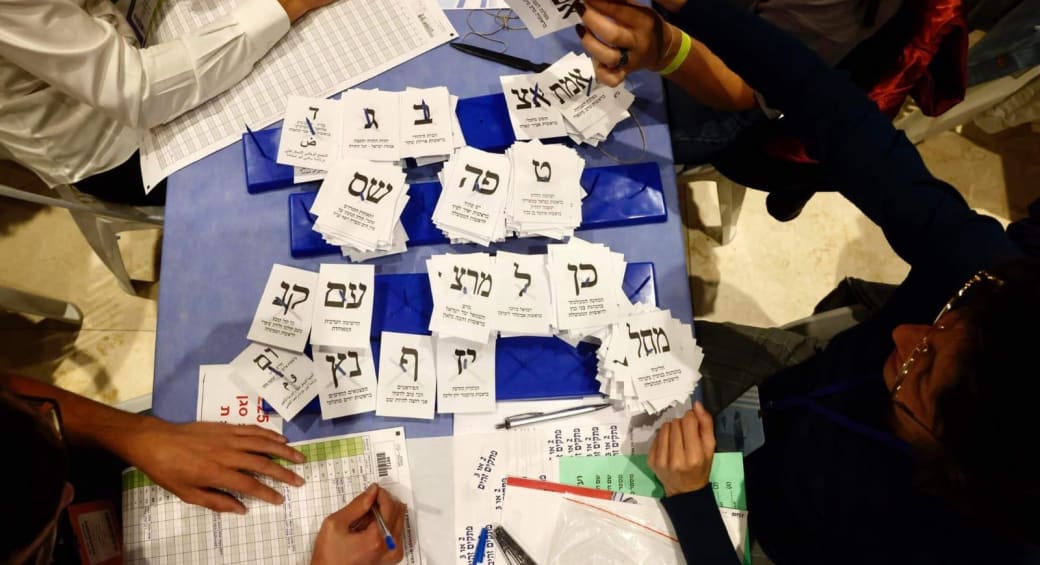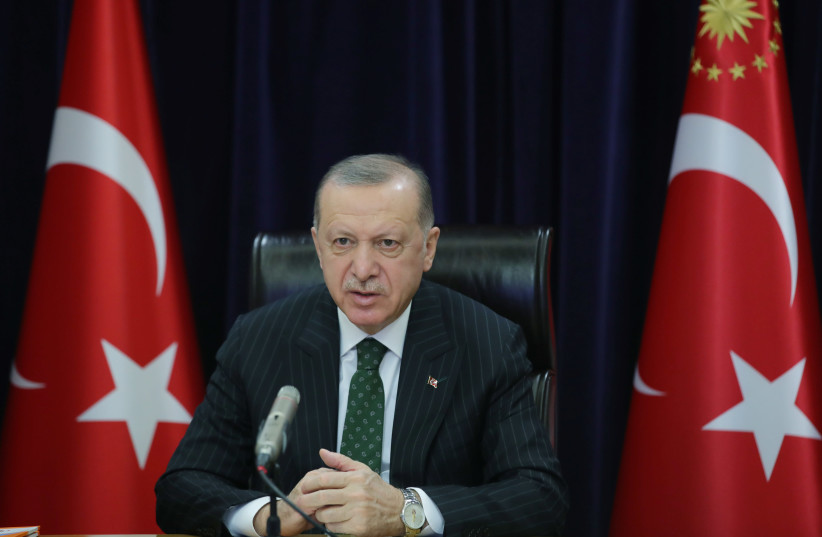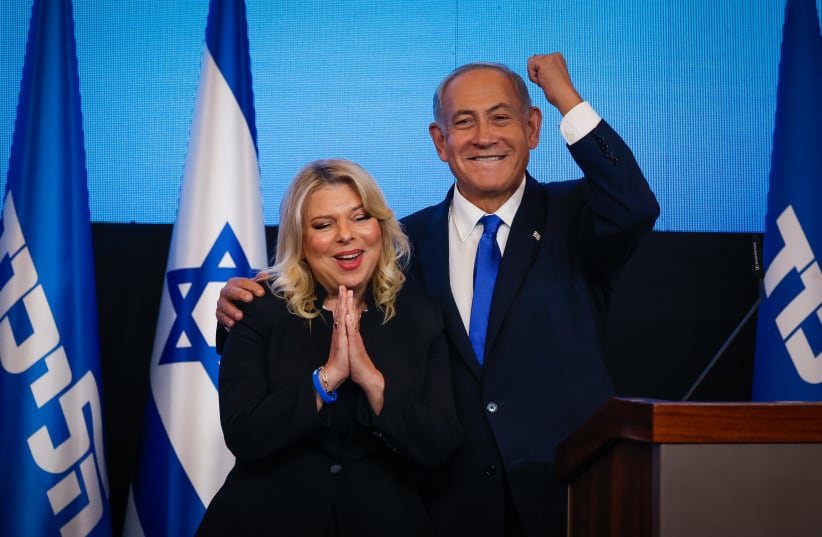Israel election: Final results announced for election 2022
With Meretz and Balad definitely below the threshold, Netanyahu is ensured victory and will look to form a coalition.

Hadar Mukhtar on election failure: The people are stupid
Fiery Youth leader Hadar Mukhtar blasted the Israeli public in a scathing response to her party's failure to pass the electoral threshold in Tuesday's general election, Maariv reported on Thursday.
"Well I kept quiet long enough," said Mukhtar. "You want to know what I really think about the election results? The people are stupid and the people will pay. Don't cry to me that apartment prices will increase next year by 22%. You chose it, You will pay."
Fiery Youth received around 7,000 votes, according to ballot counts at the time of writing.
Ben-Gvir: Yet another stabbing attack in twilight of Lapid gov't
Otzmah Yehudit Leader Itamar Ben-Gvir criticized Yair Lapid's government, calling to restore security in response to news of at terrorist attack, and sent well wishes to the injured.
"The twilight of the Gantz-Lapid government ends with another stabbing attack," said Ben-Gvir. "It's time to restore security to the streets, it's time to put order here, it's time to have a head of the household here, it's time that a terrorist who goes out to carry out an attack is eliminated!"
90.1% of votes counted
90.1% of ballots from Tuesday's general election were counted by 7:00 a.m. on Thursday.
There were no changes in the distribution of Knesset seats to parties.
15% of double envelopes counted, Balad and Meretz drop
With around 15% of the double envelopes counted, the Meretz has dropped to around 3.15% of the vote, and the Balad party below 3%, Israeli media reported on Thursday morning.
The Turkey-Lebanon nexus that may confront Netanyahu - analysis
The Turkey ties and the Lebanese mezze of problems are tied to wider challenges in the region. Netanyahu, if and when he forms a government, will need to deal with two potentially interlinked crises.
As Benjamin Netanyahu appears poised to return as prime minister, with an even stronger and potentially more stable coalition than in the past, he will face many foreign policy issues that he has dealt with before.
In many cases, these will be known quantities, such as close Israel-India ties, or managing the alliance with the US, working with the EU, the Abraham Accords and Greece and Cyprus.
However, two countries stand out as a nexus of problems: Turkey and Lebanon.
It’s worth mentioning before going on that obviously the Ukraine crisis and Russia’s invasion will be an issue for Netanyahu to deal with, but that is worth an entire discussion on its own. The Turkey-Lebanon nexus is an issue that is complex because the Lapid-Bennett government which is leaving office, has left Netanyahu with two pots on the stove.

Israel and Turkey: Old ties renewed
Israel and Turkey renewed diplomatic ties during the outgoing government’s time in office and in the last year there have been many high-profile visits. These were an unprecedented number of visits for such a short time. Israel’s President Isaac Herzog went to Turkey, and the Turkish foreign minister came to Israel, then Israel’s defense minister went to Turkey. These visits marked the first time that many of these kinds of meetings had taken place for a decade or more.
Ankara has been one of the most hostile countries to Israel in the last decade. Ankara’s ruling AKP party compared Israel to Nazi Germany numerous times in 2018 and 2019. Ankara hosted Hamas terror leaders and reports in foreign media said Hamas planned attacks from Turkey. In addition, the Mavi Marmara flotilla, destined for Gaza, was organized by far-right extremists in Turkey. When the Abraham Accords were announced, Ankara tried to sabotage them by threatening to break relations with the UAE. Turkey also tried to meddle in Greece-Cyprus-Israel ties.
However, in the last year and a half, Ankara has felt that it has few friends in the West and in Washington. It has pivoted and sought to reconcile with many countries in the region, including the UAE, Egypt, Saudi Arabia and Israel.
The outgoing government was keen to renew ties. However, it did so much reconciling that it’s not clear if it followed the maxim “trust, but verify.”
Was Ankara using Israel merely to try to get influence in Washington, doing outreach to pro-Israel voices in the US so as to get favors on the Hill? What has Ankara done for Israel?
Turkey did detain Israeli tourists on trumped-up charges, something that Ankara often does with countries, threatening them and pretending to climb down so as to get back to “zero” and make it seem Turkey did something positive. In addition, Turkey has said it has prevented attacks on Israelis. But one might ask why Iranians or others threatening Israelis can operate in Turkey in the first place?
One thing is clear: When Netanyahu was in charge, his motto was “strength” and he never allowed Turkey to threaten Israel without responding in kind. Netanyahu was a keen supporter of the Kurds and was always willing to stand up to slander from Ankara. This lead to very bad relations, but those bad relations were not the fault of Jerusalem. Now there are new ties, but it is not clear if Ankara will be able to change its old habits of bashing Israel now that the Right is apparently coming back to power in Jerusalem.
Will Ankara use upcoming elections to turn on Israel and will Netanyahu respond, or will caution on both sides prevail? These are key questions.
At the same time, Turkey likely watched Israel’s decision to enter a maritime deal with Lebanon and wonders what that portends.
Turkey has been working with Libya on maritime and defense deals that would lead to a new crisis between Ankara and Athens. Ankara has been threatening Greece over the last year and this has led to concerns about possible conflict. Although that seems far from possible, it’s plausible Ankara could create a crisis. Israel has close ties with Greece and Cyprus and while Israel does not want to be in the middle of a conflict in the Eastern Mediterranean, Netanyahu was keen on Greece-Israel ties. This means that maritime borders matter.
Lebanon and Israel: Maritime border and gas deal
Because maritime borders matter, the recent deal between Israel and Lebanon also saddles any incoming Israeli government with complex problems. The Lapid government rushed into a US-backed deal with Lebanon, amid threats by Hezbollah and demands from Hezbollah that Israel not exploit energy resources in the Karish field. While Israel has rights to do what it wants in Karish, Lebanon has extended its claims, setting up potential tensions. Yet, behind Lebanon’s claims were Iran and Hezbollah trying to lay claim to waters off the coast.
Israel signed a deal with Lebanon that some think will lead to peace and prosperity on both sides, but there is no guarantee Hezbollah will not feel its “victory” in the deal, which is what it tells itself it accomplished, will not lead to provocations. Hezbollah could use the cover of foreign companies exploring in the Kana field, on the Lebanese side of the line, to threaten Israel or provoke tensions. If Israel responds then Israel could be portrayed as breaking the agreement. In this setup, Hezbollah can do whatever it wants because it is an illegal armed terrorist mafia militia, and Lebanon can eschew any responsibility, pretending that Hezbollah just does what it wants.
The incoming government will need to examine the deal with Lebanon. Netanyahu was critical of the deal, but that could have been just election-eve criticism. Nevertheless, signing a deal as important as the Lebanon deal on the eve of the elections appears problematic. The next government will need to abide by this deal.
As we have seen with the Iran deal, countries and terror proxies linked to Iran like to force “deals” on democracies by threatening war if the democracies don’t accept the terms. Their gamble is that countries prefer deals to war. Netanyahu’s policy has generally been to try to avoid war but also keep up deterrence or at least keep up some kind of managing of these conflicts, as he did in Syria for a decade. This means that while Netanyahu is very familiar with the issues in the northern maritime border, and the Hezbollah-Iran axis, a new maritime deal adds weight to Israel’s freedom of action in the north.
Together, the Turkey ties and the Lebanese mezze of problems are tied to wider challenges in the region. Netanyahu, if and when he forms a government, will need to deal with two potentially interlinked crises both of which Iran, via Hezbollah, and Turkey or Hamas could cook up at any time.
Go to the full article >>89.1% of votes counted
As of 12:15 a.m., 89.1% of the ballots cast in Tuesday's general election were counted.
There have been no changes in mandates.
Netanyahu assured with near-certain victory as almost 90% votes counted
On Wednesday night, Meretz was placed just below the threshold of 3.25%, and the Likud led with 32 seats.

Likud leader MK Benjamin Netanyahu will with near certainty be Israel's next prime minister after approximately 90% of the votes counted, the Central Election Committee's data shows.
At press time on Wednesday, the Netanyahu coalition will consist of 65 MKs, while the Lapid bloc will consist of 50 and Hadash-Ta'al five.
The results after 87.6% of the vote were: Likud 32, Yesh Atid 24, Religious Zionism Party (RZP) 14, National Unity 12, Shas 11, United Torah Judaism (UTJ) eight, Yisrael Beytenu five, Ra'am five, Hadash-Ta'al five and Labor four.
Meretz stood at 3.19% of the general vote, below the requisite 3.25% electoral threshold.
Balad also stood underneath the threshold at 3.02%. Interior Minister Ayelet Shaked stood at 1.16%. and will not be a part of the upcoming Knesset.

The remaining votes are approximately 570,000 "double envelopes" of citizens who voted outside of their hometowns, including IDF soldiers, Israel Police officers, diplomats abroad, disabled peopl, COVID-19 patients and more. The Central Election Committee was set to begin counting these votes at 11:00 p.m. on Wednesday, and said it hopes to have the full results by Thursday afternoon.
The percentage of double envelopes is expected to eclipse 10% of the general vote for the first time, leaving open the possibility for Meretz to push ahead of the threshold. However, the double envelopes historically have benefited the Right. Regardless, in order to pass the threshold Meretz would have to win 3.66% of the double envelopes – a rate nearly 0.5% higher than in the standard votes. In the previous election, in comparison, Meretz's performance in the double envelopes was just 0.26% higher than the regular vote. If Meretz performs similarly, it will miss the threshold by a few thousand votes.
MK react to exit polls and emerging results
According to Israeli law, the official results must be handed to President Isaac Herzog eight days after the election, meaning by November 9. The president then has a week, until November 16, to consult with the heads of the parties as to who should receive the mandate to form a government. These consultations will be broadcast live. The MK who receives the mandate, presumably Netanyahu, then has 28 days to form a government. The dates are a maximum, but the process could be quicker.
Other than voicing their thanks to supporters, most of the party leaders kept a low profile on Wednesday, as they waited for the official election results.
National Unity leaders Defense Minister Benny Gantz, Justice Minister Gideon Sa'ar and former chief of staff Gadi Eisenkot met in the afternoon and announced that they were heading to the opposition, ending any doubt that they were planning on joining a Netanyahu government instead of RZP.
"The State of Israel faces great challenges that will be faced by a government that relies on extremist elements," Gantz wrote on Twitter alongside a picture of the three during their meeting. "We decided to continue establishing the state camp as a significant movement in the center of the political arena," he wrote.
"We respect the decision of the voters, and after the formation of the government, we will serve as a responsible opposition while we continue to build National Unity as a governing alternative," Gantz added.
RZP head MK Bezalel Smotrich called on Wednesday evening for the heads of the Netanyahu bloc to convene over the next few days in order to draw up coalition agreements, even before President Herzog awarded the mandate to Netanyahu to form a government. This would convey that the parties have "come to work," Smotrich said.
Shaked wrote a long post on Facebook, conceding defeat and summarizing her political experience.
She listed her accomplishments in the Justice and Interior ministries and wrote that unlike some other politicians who were good at writing "venomous" posts on Twitter, she knew the meaning of real change.
"Unfortunately, even within my own camp there were those who were quick to attack me, who apparently believe that revolutions of historic proportions are supposed to happen at the speed of typing a venomous and sophisticated tweet on Twitter.
"Well, they are not," Shaked concluded.
Go to the full article >>Likud passes one million votes mark
Benjamin Netanyahu's Likud party reached one million ballots counted for it from the Tuesday general election, Israeli media reported on Thursday morning,
Netanyahu's Right won, but can he build a coalition with Ben-Gvir?
For Netanyahu, Shas and UTJ are dream coalition partners. The Religious Zionist Party, featuring Itamar Ben-Gvir, is an Israeli diplomatic nightmare.

"Good morning Israel," an ecstatic MK Itamar Ben-Gvir tweeted the morning after the Religious Zionist Party (RZP), in which he is the second top politician, soared to an unprecedented 14 seats in Tuesday's election.
"The time has come for a full-fledged right-wing government. The time has come to be the masters of the house in our own country," Ben-Gvir wrote.
"The time has come for a full-fledged right-wing government. The time has come to be the masters of the house in our own country."
Itamar Ben-Gvir
It was a fantasy turned into reality moment for a long-time anti-establishment activist turned attorney, who is now likely to be on his way to be a minister in the next government.
The dawning of Israel's new political reality
Israel woke up to a new political universe on Wednesday, in which its rainbow government of right, center and left-wing parties, will now likely be replaced with one of the most right-wing governments in Israel's history.

On the surface of it, Ben-Gvir's tweet isn't a prophecy, it's simply a statement of the new political reality in Israel.
Given the election results a right-wing coalition is so obvious, one could imagine for a moment that the political paralysis that has gripped the country since the end of 2018, plunging it into an unprecedented sequence of five elections cycles, has now ended.
Likud leader Benjamin Netanyahu, now likely to be given the first chance to form a government, should be able to come to coalition agreements with the (RZP) and the two ultra-religious parties Shas and United Torah Judaism for a 65-seat government.
It's a move that could return Netanyahu to the Prime Minister's Office, following the electoral loss that ousted him in 2021.
More than Ben-Gvir's moment, this should be Netanyahu's moment.
Netanyahu, who was in office from 1996-1999 and again from 2009-2021, prides himself on being the undisputed leader of the Israeli Right.
A fluent English speaker, who studied at both Harvard and the Massachusetts Institute of Technology, he has walked a tight-rope balance between successful diplomatic discourse with the international community, while simultaneously holding onto his right-wing base. Looking back at his track record one can discern four relevant patterns to the way he operates.
In the first pattern, Netanyahu often uses checks and balances, both on the international stage and in coalition building, in which he is willing to suffer diplomatic or political losses in other victories.
One need look no further than the agreement he made in 2020 to suspend the application of sovereignty to West Bank settlements in exchange for the Abraham Accords in which Israel normalized ties with four Arab countries.
Under the second pattern, Netanyahu is more likely to move the situation forward in small discernible steps, rather than dramatic upheavals.
Third, he must stand in the center of the stage with full political freedom to act rather than suffer under constrictions from his coalition partners. It is often when they try to overly dictate government policy that he seeks either to replace them with more pliable partners or to collapse the government altogether.
Fourth, Netanyahu often buys wiggle room to take unpopular steps, by blaming another politician for gumming up the works.
For Netanyahu, Shas and UTJ are dream coalition partners, particularly given that combined they received a hefty 19 of the 61 needed seats to form a government. Their demands are often domestic and do not have severe consequences for Netanyahu.
Religious Zionist Party is Netanyahu's unwieldy diplomatic nightmare
The RZP was a helpful party for Netanyahu to campaign with on shared values of a greater land of Israel, Jewish sovereignty and opposition to Palestinian statehood. In reality, they present him with an unwieldy diplomatic nightmare.
The party calls for the full application of sovereignty over West Bank settlements or at the very least in the settlement blocs.
Failing that it wants to move forward on de facto sovereignty in Judea and Samaria, including disbanding the IDF's civil administration and allowing Israeli miniseries to govern Israeli civilian life in the West Bank.
The RZP wants to see the authorization of 70 West Bank outposts, which it calls "young communities," either as new settlements or as neighborhoods of existing ones. It opposes Palestinian development in Area C of the West Bank and wants the IDF to increase its demolitions of illegal Palestinian construction.
Then there is the issue of its support for Jewish prayer on the Temple Mount. These are only some of their issues, which also include harsher responses to Palestinian violence in the West Bank and death sentences
It's likely to want to see some of these demands in its coalition agreement with Likud, but action on any of them would likely put Netanyahu on a collision course with US President Joe Biden who is opposed to all such actions, to say nothing of European Union opposition.
That is on top of the already existing objections to Ben-Gvir, whose victory speech was interrupted by calls of "death to terrorists," a slogan that critics worry was a toned-down version of "death to Arabs."
Unlike Netanyahu who excels at bending without folding, the RZP is likely to take die-hard stands on its issue, particularly given its large size, thereby extending and complicating the negotiations process.
It's likely that to circumvent RZP die-hard stands, Netanyahu could turn to the National Unity Party head Benny Gantz, who at 12 seats could be an alternative from a policy perspective. It's not an easy replacement, given that Gantz has repeatedly stated that he Is opposed to joining a Netanyahu coalition and their pasts attempt to sit together did not even last a year.
Still, despite their enmity, Netanyahu has more in common with Gantz ideologically than with the RZP.
When he was first elected in 2009, Netanyahu represented the hard right, but over time he has become one of the most moderate members of the nationalistic camp that he leads, even within his own party.
In a Gantz union, Netanyahu can continue to protest that he is a die-hard right-winger held back by the National Resilience Party. In a coalition with RZP, Netanyahu risks suddenly standing out as a centrist.
Smotrich told Channel 12 on Wednesday night, that he thought coalition talks could be quickly wrapped up.
The next weeks, however, are likely to represent a game of protected political chicken between Netanyahu and RZP head Smotrich, in which the right-wing dream coalition could fall apart, as the two parties try to bring their differences.
Netanyahu of course could get over the first political crisis in the name of putting a government in place, by paying lip service to a coalition agreement with the RZP he can never fulfill in the next two years.
For that to work the RZP, will in the name of being in the government, likely have to agree, not to walk when it turns out those demands are not met.
At the end of the day, it has been divisions in the right-wing camp, not the strength of the Left, that have prevented a full right-wing government. The right-wing nationalistic camp is often united in values but divided on how to execute them.
Unless the RZP reduces its maximalist demand, this right-wing dream coalition is likely to be brief and fleeting, if indeed it ever gets off the ground.
Go to the full article >>Meretz drops to 3.159% of vote
As double envelope ballots for Tuesday's general election continue to be counted, the Meretz Party dropped to 3.159% of the vote. Israeli media reported on Thursday morning, citing sources in the Election Commission.
Voting facts
- The electoral threshold is 3.25% of votes
- 61 mandates are needed to form a government, which can be achieved through a coalition